
Record settler attacks in West Bank opening up rifts within Israel
2025-11-14 22:01:26
Lucy WilliamsonMiddle East correspondent in the West Bank
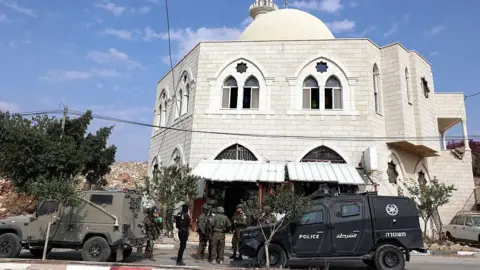 Zain Jaafar/AFP via Getty Images
Zain Jaafar/AFP via Getty ImagesTraces of the attack on the Hamida Mosque near Deir Istiya in the occupied West Bank are still scattered on the ground outside.
Charred furniture, pulpits and smoke-filled carpets are piled around the entrance, eviscerated and the debris removed at the time of Friday prayers.
Dozens of men arrived to pray in a show of defiance, their backs turned to the burning and blackened wall.
The imam of the mosque, Ahmed Salman, told the BBC that the attack that occurred on Thursday was a message from Jewish settlers, amid a wave of settler violence across the West Bank.
“The message they want to send is that they can reach anywhere – to the cities and villages, and that they can kill civilians and burn homes and mosques.”
“I feel it in my soul,” he said. “It is not permissible to touch places of prayer, wherever they are.”
But there was a message here too for Israel’s regional military commander, written in Hebrew on the outer wall of the mosque: “We are not afraid of you, Avi Bluth.”
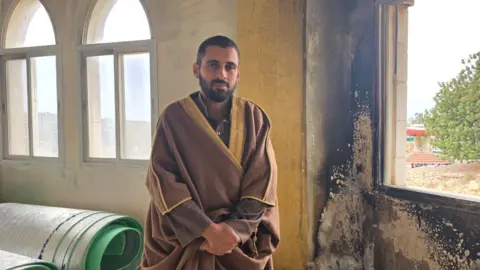
Escalating settler attacks here over the past six weeks have sparked stern warnings from army commanders, along with a number of arrests and investigations.
But hardline expansionist settlers enjoy government support, which some believe is pushing the West Bank toward a dangerous confrontation.
The annual olive harvest season, when Palestinians try to access their farmland, often marks an escalation in violence, but the attacks this year broke UN records.
The UN Office for Humanitarian Affairs recorded more than 260 settler attacks resulting in Palestinian casualties or property damage in October alone – the highest monthly number since the Office began monitoring in 2006.
Human rights groups say that settler attacks on Palestinians have escalated since the start of the Gaza war in 2023 after Hamas attacks on October 7. United Nations figures indicate that more than 3,200 Palestinians have been forcibly displaced due to settler violence and the restrictions imposed on them since then.
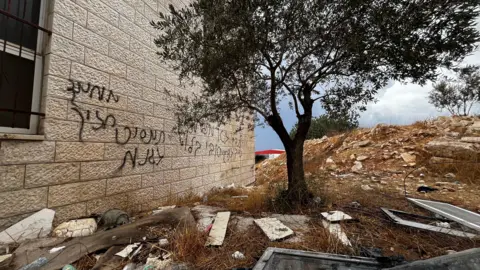
In the past few days, several attacks have occurred across the West Bank, including an attack by a large crowd of masked men on an industrial area and Bedouin buildings near Beit Leed. Surveillance cameras filmed them running across the hills and through the factory gates, where they set several trucks on fire. The army said it later attacked Israeli soldiers working nearby.
An Israeli police spokesman said that four suspects were arrested. Three of them have reportedly since been released.
Last week, in the olive groves surrounding Beita, Reuters journalist Raneen Sawafta was beaten by a settler with a club while covering her olive crop – a deep dent in her helmet clearly showing the force of the blows.
Hamad Al-Jajoub Abu Rabia, a Red Crescent volunteer in Beita, was also injured after he went to help her. He was hit in the head by a stone and was then taken to the hospital.
“I never imagined that a human being created by God would do this,” he said. “If they had an ounce of humanity, they wouldn’t have done this to a woman. If it wasn’t for her helmet, she would have died.”
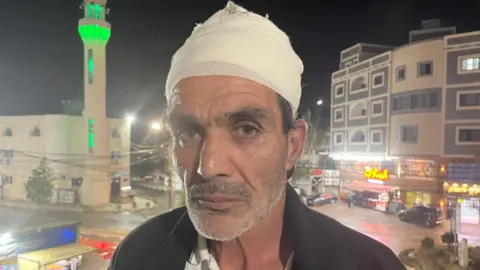
Less than three weeks ago, it was Afaf Abu Alia, 55 years old He was severely beaten with a baton While she was lying on the ground during a settler attack, after picking olives from agricultural land she rents near the village of Abu Falah. The video of her assault sparked international condemnation.
“One of [the settlers] She told the BBC: “They attacked me and started beating me. They hit my head, arms and legs, and kicked my legs with their shoes.” I wasn’t aware of what was happening, my mind was blank – I was just feeling pain. I felt like my soul left my body. The only thing I thought about was my children.”
Afaf, who is now recovering at home, said she is still in pain, with 20 stitches in her head, and bruises on her arms and legs that have left her unable to sleep.
She said that the settlers prevented the family from accessing their agricultural lands, and that they rented land elsewhere to grow olives this year.
Afaf said: “I would go back there today if I could, because I am not afraid of them.” But she also admitted that the situation has become more serious.
“They were not like this at the beginning of the war,” she said. “This year, their business has increased more than in all previous years.”
A man was arrested in connection with her assault. Such arrests are rare, and convictions even rarer. The Israeli human rights organization Yesh Din found that over the past two decades, more than 93% of police investigations into Israeli crimes against Palestinians in the West Bank have been closed without any charges being brought.
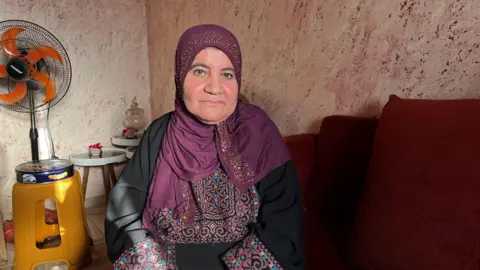
Israeli forces have long been criticized by human rights groups for standing idly by during settler attacks – or even participating in them.
The Israeli chief of staff said this week that he strongly condemned the recent violence committed by Israeli settlers, calling it a “red line” and promising to “act decisively.”
The head of the military’s Central Command, Major General Avi Bluth, the man covered in the graffiti at the Hamida Mosque, said that acts of violence committed by what he described as “anarchist youth extremists” were “unacceptable and extremely dangerous” and must be dealt with firmly.
Some hard-line settlers see these comments as treason.
Amichai Luria, a longtime settler from Maale Levona and a winery manager in the nearby settlement of Shiloh, told me that the current focus on settler violence is exaggerated.
“It’s amazing to me how people talk about these rare occasions [when] He said: “People are misbehaving. Oh, some people were trying to pick olives and some Jews came and bothered them. Give me a break. There are more cases of theft on the high street in London than there.” [are] here.”
I asked him about the brutal beatings women endured and the almost daily reports of incidents in the surrounding areas. He rejected it and described it as “an attempt to distort the image of the Jews.”
“Most Arabs, if they could, would follow Hamas or Hezbollah,” he said. “Very, very, very few Arabs want to coexist or live in peace, and at the first opportunity they get, they will annihilate us.”
“The future is very simple. We hope that the army will wake up, and we hope that the people will understand that we have to prepare ourselves, and that they are coming after us.”
The United Nations Office for Humanitarian Affairs says that of the 1,000 Palestinians killed in the West Bank since the start of the Gaza war, between 20 and 32 were killed by Israeli settlers. It says that during the same period, Palestinians killed 19 Israeli civilians.
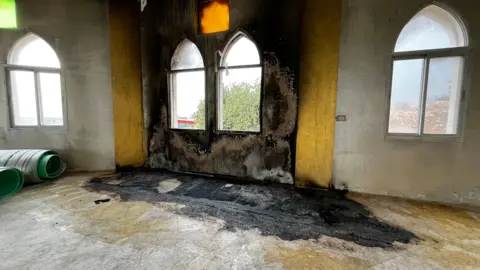
The decision by military commanders to issue orders to take action on settler violence will serve as a test of discipline in the army as settlers make up a growing proportion of the forces.
It also risks exposing dangerous divisions between Israel’s military and political leaders.
The radical settlers say their claim to the land comes from the Bible, but their growing confidence comes from government support.
Since the Hamas attacks of October 7, 2023 and the ensuing Gaza War, Israel’s far-right National Security Minister, Itamar Ben Gvir, has distributed more than 100,000 weapons to civilian security forces, including in West Bank settlements, and has urged Israel to formally annex the West Bank.
The government has allowed a significant expansion of settlements, and has legitimized some unauthorized outposts. Israeli settlements in the West Bank are considered illegal under international law, although Israel objects to this.
Last year, Defense Minister Yisrael Katz banned the use of administrative detention of Jewish settlers in the West Bank — reportedly against the advice of Israel’s National Security Agency.
The Israeli army is now asking Katz to return this authority to help limit settler violence. Administrative detention, which allows suspects to be held for six months renewable without charge, remains widely used for Palestinians.
“I don’t trust the army as much as I used to,” Amichai Luray told me. “A lot of people in the army are anti-Israel from top to bottom. Trust me, the army is not united.”
The Israeli army is currently embroiled in a legal and political scandal surrounding it Leaked video footage It allegedly shows the mistreatment of Palestinian detainees – an issue that has pitted ultra-nationalist politicians against the country’s security forces.
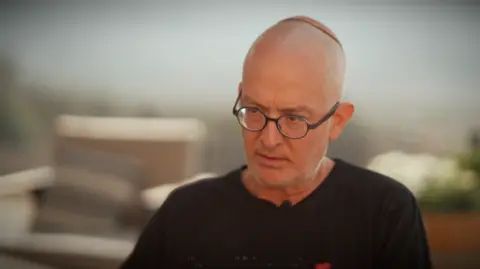
As worshipers left Al-Hamidah Mosque after Friday prayers, Israeli activists arrived for a visit to show solidarity. Martin Goldberg, originally from London, was one of them.
I asked him about Israeli claims that settler attacks are exaggerated.
“These are very minor attacks when they’re not happening to you,” he said. “These attacks are not small, they are very big. Everyone is trying to downplay them, [saying] Oh, they’re just “weeds in the field” but they’re not. They are supported by the government. The local councils support them 100% and finance them.”
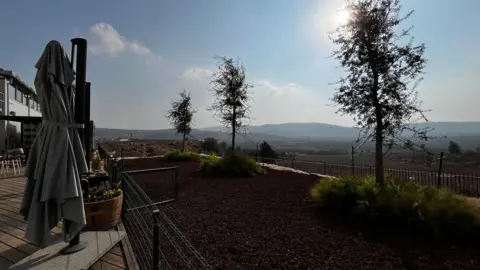
Many local councils provide support and assistance to the settlement outposts, but they have publicly condemned the violence of some settlers there. This week, the head of the West Bank Settlers Council issued a statement supporting the Israeli army’s arrest of “anarchists” who harmed soldiers and civilians.
“Europe, the United States, and everyone in the whole world is watching the West Bank,” said Wadi Abu Awad, a civil engineer who lives in the nearby village of Turmus Aya, which has witnessed repeated attacks.
“We are not fighting with the Israelis. We are not killing Israeli soldiers, and we do not have any hostages. They are [settlers] They push us into a corner. “You know, if a cat is pushed into a corner, it might become a tiger.”
https://ichef.bbci.co.uk/news/1024/branded_news/ddd4/live/7c0864c0-c198-11f0-b1da-c7b043da88d2.jpg










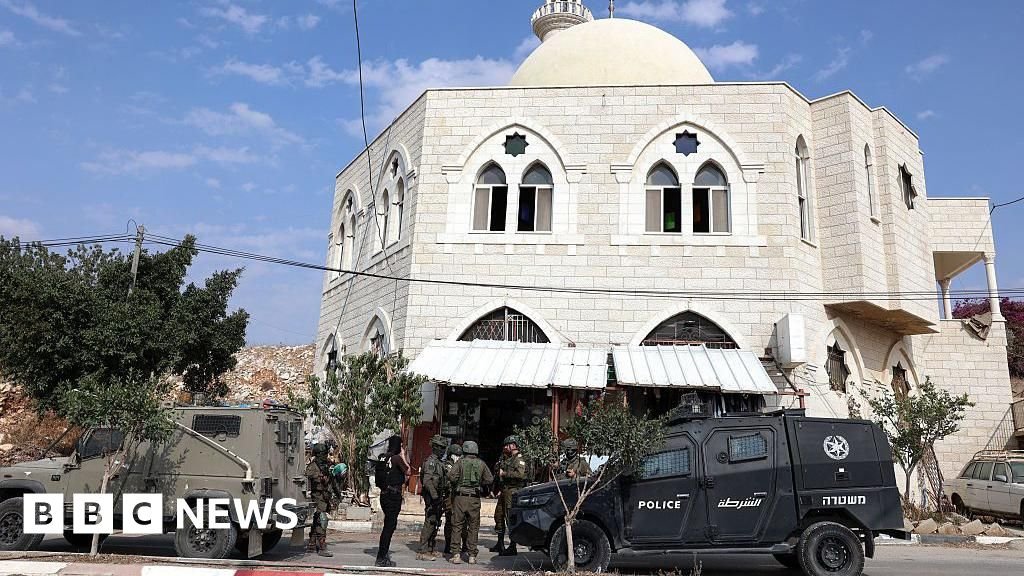


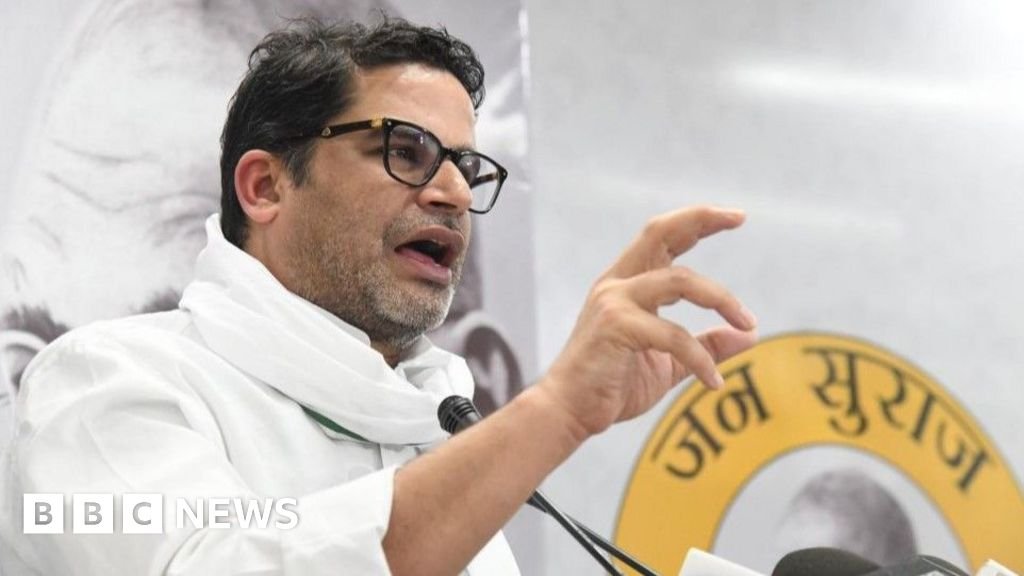






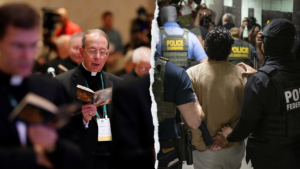
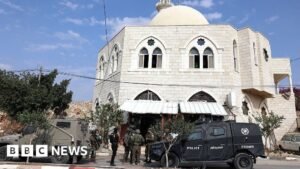




إرسال التعليق